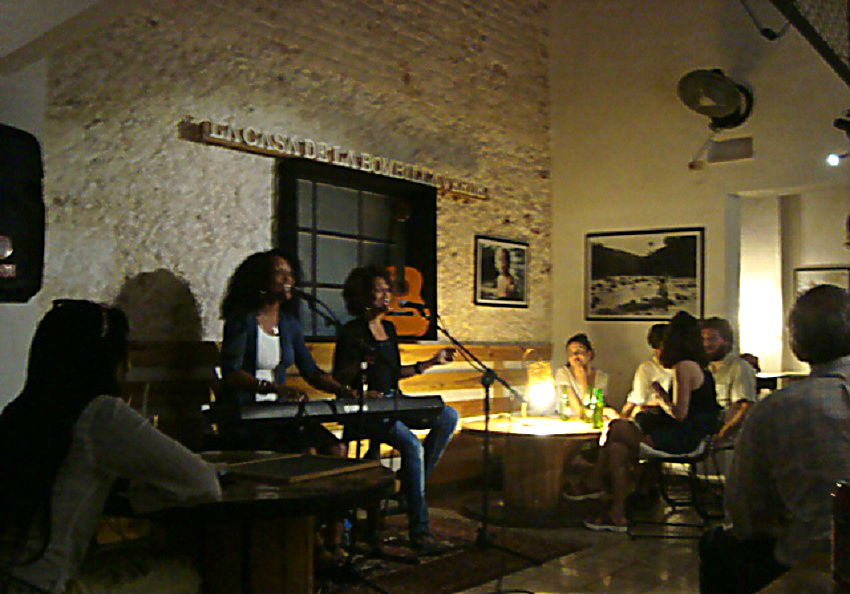Sabrina Otegui/Havana, Cuba. Those of us who work every day witihn the Basque community understand that after centuries of migration, the Basque culture and Euskera have spread throughout the world. However, we are still surprised when we run into a triki-poteo in San Telmo (Buenos Aires), or a Korrika in the Malecon de Miraflores (Lima).
This is why, despite knowing about the Basque presence on the island of Cuba, hearing voices singing in Euskera, singing the classics in a bar in Vedado, in Havana also surprised us and we couldn’t resist entering to find out what was going on. In “The House of the Green Lightbulb,” we met sisters, Danieuris and Daniellis Moya Avila, members of D’Capricho a duo from Cuba that shine on stage with the typical tropical genres and with musicalized versions of poems in Basque. After the concert, EuskalKultura.com had the opportunity to visit with them:
-How is it that two Cubans have a Basque repertoire?
We sing in Basque and in Spanish. We are from Manzanillo, in the Province of Granma, and we study music at the National School of Art. Some years ago, we met a Basque, that is currently my husband, and I went to Euskal Herria with him where we currently reside. Prior to that, I had some idea of the Basque culture, but then I ended up falling in love with Euskadi and its language.
-Is that how your CD “Andrazkubak” came about?
Yes, we had recorded an album where we put Cuban poetry to music and this experience encouraged us to do the same with poems in Basque. We had been working on the texts for some time, especially those of Leire Bilbao and Jon Gerediaga…Danieuris composes and likes to experiment with new genres. That is how we put “Andrazkubak” together that includes ten song, all poems by Basque women, specifically, Leire Bilbao, Arrate Mardaras and Miren Agur Meabe. It is an album that we produced ourselves and it has varied styles, and the poets are also very happy with how it turned out.
-This CD was presented at the Durangoko Azoka in 2015…
Yes, and then there were several concerts. Our first tour of the Basque Country was in 2013, and in two months we performed 43 concerts. I still remember our first recital in Ondarroa, because the boys from the Gaztetxe displayed photos of Che, Camilo and the Cuban Flag….we were so emotional, we weren’t sure we’d be able to sing. The first concert at the Trinkete in Gernika was also very special because there were Basques who had heard us perform here in Cuba. In Larrabetzu, for example, their festival is on July 29 and they have invited us every year since the first time we went to sing on this day (July 26th is the anniversary of the beginning of the revolution in Cuba) and so it is really very emotional. Since 2013, we have done four tours, we have played in many towns, and we have been received very very well.
-It probably has something to do with your singing in the same language of your audience…
Yes, I (Daniellis) living in Berriz (Bizkaia) I am in touch with Euskera and I’m studying at a Euskaltegi. Danieuris is also studying here in Havana. Euskal Herria has become our second homeland and you have to speak the language of your homeland. Besides, it isn’t difficult and it brings us riches. Danieuris has composed Cuban music of various genres, and has done some fusion but with Euskera she has had the possibility of experimenting with other genres and the language “comes like a ring on your finger,” it is a magic language and is very musical.
-Daniellis lives in Berriz and Danieuris in Havana, but you still work together. What is on board for 2018?
Besides our projects in Spanish, in 2018 we will return to Euskal Herria to perform another series of concerts this summer, as we have done in other years, but with some new additions to our repertoire. In fact, we are preparing our second album in Euskera.
We are counting on this performance because we think it is beautiful to be able to go and sing in Euskera to Basques. It is really beautiful to see firsthand what is happening there. Before traveling there for the first time, we already knew something because our former commander kept us very informed. We are interested in independence because that has taught us. We were born with Fidel and this has taught us…We are sentimental and our feelings are carried on our sleeves, and when Basques in Euskal Herria tell us about their history and their struggle, we can’t do anything else but sing from the heart. We advocate because the countries that fight for their independence can get it. In addition, Basques are very supportive. They say they are closed, but hey have an open soul. They open their souls and their hearts.
D'Capricho online:
Facebook: D Capricho D Capricho
Youtube: D' Capricho






 Send to a friend
Send to a friend Add comment
Add comment








